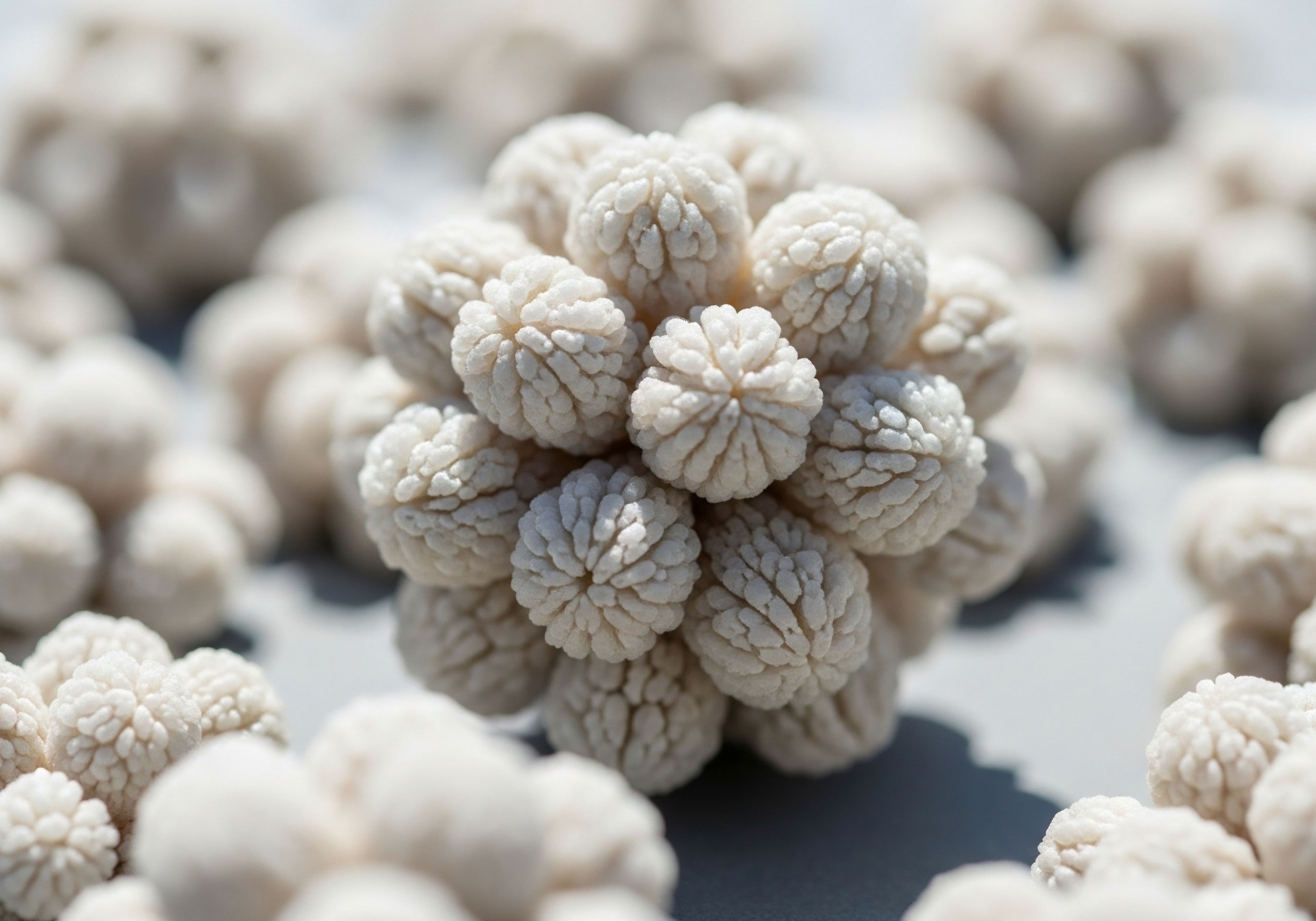

Fundamentals
The sensation of waning vigor, a subtle but persistent erosion of one’s physical and mental capacities, often prompts individuals to seek clarity regarding their internal state. Many men experiencing diminished energy, changes in body composition, or reduced libido find themselves navigating a landscape of unfamiliar symptoms. This experience frequently signals a shift in the body’s intricate hormonal messaging system, specifically a reduction in testosterone levels, a condition known as hypogonadism.
Hypogonadism extends its influence beyond merely reproductive functions; it reverberates throughout the entire physiological architecture. Testosterone, a primary androgen, orchestrates a vast array of bodily processes, impacting everything from bone density and muscle mass to mood regulation and cognitive sharpness. Its decline often coincides with shifts in metabolic health and, significantly, can bear implications for cardiovascular wellness.
Low testosterone, a condition affecting many men, impacts more than just vitality, it influences metabolic and cardiovascular health.
For those experiencing these profound changes, the prospect of restoring hormonal balance through targeted interventions, such as topical testosterone gel, presents a pathway toward reclaiming vitality. This approach aims to replenish the body’s testosterone reserves, thereby recalibrating the internal systems that rely on this crucial hormone for optimal operation. The application of testosterone through the skin offers a consistent, physiological delivery method, allowing for a steady absorption that mirrors the body’s natural rhythms.

Understanding Hypogonadism and Its Systemic Echoes
A proper diagnosis of hypogonadism involves a careful assessment of symptoms alongside blood tests to measure circulating testosterone levels. Symptoms can vary widely, encompassing reduced sexual desire, erectile challenges, decreased muscle strength, increased body fat, fatigue, and even subtle alterations in mood or concentration. These manifestations represent the outward signals of an internal endocrine system seeking equilibrium.
The connection between low testosterone and cardiovascular health emerges as a subject of considerable scientific inquiry. Studies reveal associations between suboptimal testosterone levels and various markers of cardiovascular risk, including unfavorable lipid profiles, insulin resistance, and heightened inflammatory states. Addressing these underlying hormonal imbalances offers a strategic avenue for potentially mitigating these associated risks and supporting broader systemic health.


Intermediate
Navigating the therapeutic landscape for hypogonadism involves understanding specific clinical protocols designed to restore hormonal equilibrium. Topical testosterone gel represents a frequently utilized modality within these protocols, offering a non-invasive and generally well-tolerated method of hormone delivery. The precise application of this gel allows for transdermal absorption, facilitating a steady influx of testosterone into the bloodstream, which often leads to a more stable physiological concentration compared to other delivery methods.

Implementing Topical Testosterone Therapy
A typical protocol for male hormone optimization with topical testosterone involves daily application of a prescribed gel, often containing 1.62% testosterone, to clean, dry skin on the shoulders, upper arms, or abdomen. The exact dosage, such as 20.25 mg or 40.5 mg per day, is meticulously titrated based on an individual’s baseline testosterone levels, symptom presentation, and subsequent laboratory evaluations. Regular monitoring of serum testosterone, estradiol, and hematocrit levels becomes an indispensable component of this therapy, ensuring both efficacy and safety.
Adjunctive medications frequently accompany testosterone gel therapy to manage potential side effects and support endogenous hormone production. Gonadorelin, administered subcutaneously twice weekly, assists in maintaining natural testosterone production and fertility by stimulating the hypothalamic-pituitary-gonadal (HPG) axis.
Anastrozole, an oral tablet taken twice weekly, serves to modulate estrogen conversion, thereby preventing potential estrogenic side effects that can arise from elevated testosterone. Enclomiphene also stands as a potential inclusion, working to support luteinizing hormone (LH) and follicle-stimulating hormone (FSH) levels.
Topical testosterone gel provides a consistent delivery method, requiring careful dosage adjustment and regular monitoring of hormone levels and blood markers.
The mechanistic underpinnings of testosterone’s influence on cardiovascular health are complex and multifaceted. Testosterone affects vascular function by modulating nitric oxide production, a crucial vasodilator. It also plays a part in lipid metabolism, influencing cholesterol fractions, and contributes to insulin sensitivity, which bears direct implications for metabolic syndrome components. These actions collectively support vascular integrity and metabolic efficiency, which are foundational for cardiovascular wellness.

Cardiovascular Outcomes and Clinical Data
Recent extensive meta-analyses of randomized controlled trials offer considerable reassurance regarding the cardiovascular safety of testosterone replacement therapy in hypogonadal men. These comprehensive reviews indicate that testosterone replacement, when appropriately prescribed and monitored, does not elevate the risk of major adverse cardiovascular events, including myocardial infarction or stroke.
One notable randomized trial, involving men aged 45-80 with hypogonadism and existing cardiovascular disease or risk factors, demonstrated that daily transdermal testosterone gel was non-inferior to placebo concerning the incidence of major adverse cardiac events.
This body of evidence counters earlier observational studies that raised concerns, reflecting a progression in our scientific understanding and study design rigor. The nuanced perspective now held by medical organizations acknowledges the absence of consistent evidence suggesting either an increase or decrease in cardiovascular risk with appropriate testosterone therapy. This refined understanding permits a more confident approach to managing hypogonadism in men with cardiovascular considerations.
| Therapeutic Modality | Primary Delivery | Key Considerations for Cardiovascular Health |
|---|---|---|
| Testosterone Cypionate Injections | Intramuscular (weekly) | Achieves rapid, sometimes fluctuating, serum levels; requires careful monitoring of hematocrit. |
| Topical Testosterone Gel | Transdermal (daily) | Provides stable, physiological serum levels; generally good for adherence; skin transfer precautions needed. |
| Gonadorelin | Subcutaneous (2x/week) | Supports endogenous testosterone production; maintains testicular function and fertility. |
| Anastrozole | Oral (2x/week) | Manages estrogen conversion, preventing estrogen-related side effects, which can indirectly affect cardiovascular risk factors. |


Academic
The exploration of topical testosterone gel’s influence on cardiovascular health in hypogonadal men demands an academic lens, focusing on the intricate molecular and cellular interactions that govern systemic function. Our inquiry delves into the profound interconnectedness of the endocrine system, particularly the hypothalamic-pituitary-gonadal (HPG) axis, with broader metabolic and vascular biology. This perspective moves beyond simplistic notions of hormone replacement, embracing the concept of biochemical recalibration to restore physiological harmony.

The Endocrine-Metabolic-Vascular Nexus
Hypogonadism frequently coexists with metabolic syndrome, a cluster of conditions including central obesity, insulin resistance, dyslipidemia, and hypertension. This concurrence elevates cardiovascular risk significantly. Testosterone acts as a pleiotropic hormone, exerting direct and indirect effects on these metabolic parameters. For instance, low testosterone levels correlate with increased visceral adiposity and insulin resistance, contributing to a pro-atherogenic environment.
Testosterone replacement therapy, including topical gel, has shown the capacity to decrease visceral fat accumulation and ameliorate insulin sensitivity, thus mitigating some of the metabolic drivers of cardiovascular disease.
The vascular endothelium, a monolayer of cells lining blood vessels, represents a critical interface for cardiovascular health. Endothelial dysfunction, characterized by impaired vasodilation and a pro-inflammatory state, precedes overt atherosclerosis. Studies reveal that lower serum total and free testosterone levels correlate with impaired endothelial function, as measured by flow-mediated dilation (FMD) of the brachial artery. Testosterone influences endothelial function through several pathways:
- Nitric Oxide Bioavailability ∞ Testosterone promotes the activity of endothelial nitric oxide synthase (eNOS), enhancing the production of nitric oxide (NO), a potent vasodilator and anti-atherosclerotic molecule. Reduced testosterone diminishes NO availability, contributing to vascular stiffness.
- Oxidative Stress Modulation ∞ Low testosterone is associated with heightened oxidative stress and inflammation within the vasculature. Testosterone exhibits antioxidant properties, helping to counteract reactive oxygen species that damage endothelial cells.
- Endothelin-1 Regulation ∞ Elevated circulating endothelin-1 (ET-1), a powerful vasoconstrictor, correlates with reduced endothelial function in middle-aged and older men with low testosterone. Testosterone may modulate ET-1 levels, supporting balanced vascular tone.

Investigating Cardiovascular Outcomes with Topical Testosterone
The Testosterone Trials, a series of seven placebo-controlled, double-blind randomized trials, offered significant insights into the effects of testosterone treatment in older men with low testosterone. While primarily assessing outcomes beyond cardiovascular events, these trials provided valuable safety data.
One trial, for instance, investigated the effect of testosterone treatment on coronary artery plaque volume, finding that testosterone increased plaque volume in some older men. This specific finding, however, stands in contrast to broader meta-analyses that demonstrate no increased risk of major adverse cardiovascular events with testosterone replacement therapy in hypogonadal men. The nuanced interpretation suggests that the effects can be context-dependent, varying with patient populations and specific cardiovascular endpoints.

Challenges in Causal Inference and Future Directions
Distinguishing between correlation and causation in the relationship between low testosterone and cardiovascular disease remains a complex undertaking. Low testosterone might serve as a marker of underlying poor health rather than a direct cause of cardiovascular pathology. Confounding factors, such as obesity, diabetes, and sedentary lifestyles, often intertwine with hypogonadism, making the isolation of testosterone’s specific causal role challenging. Longitudinal studies with sufficient power and duration are essential to further delineate these relationships.
The intricate relationship between low testosterone, metabolic dysfunction, and endothelial health highlights the systemic impact of hormonal imbalances on cardiovascular wellness.
The current body of evidence, while reassuring regarding the safety of topical testosterone gel for cardiovascular events in appropriately selected hypogonadal men, underscores the need for individualized management. This includes a comprehensive evaluation of comorbidities, a meticulous risk-benefit assessment, and ongoing monitoring of both hormonal and cardiovascular parameters. Future research aims to identify specific subpopulations who might derive the greatest cardiovascular benefit from testosterone optimization, alongside a deeper exploration of the precise molecular mechanisms involved.
| Physiological System | Testosterone’s Action | Impact on Cardiovascular Health |
|---|---|---|
| Endothelium | Enhances nitric oxide synthesis; reduces oxidative stress. | Promotes vasodilation; preserves vascular elasticity; mitigates atherosclerosis progression. |
| Metabolic Regulation | Improves insulin sensitivity; reduces visceral fat. | Decreases risk of type 2 diabetes and metabolic syndrome, which are major cardiovascular risk factors. |
| Lipid Profile | Modulates cholesterol and triglyceride levels. | Contributes to a more favorable lipid profile, reducing atherogenic lipoproteins. |
| Inflammation | Exhibits anti-inflammatory properties. | Reduces systemic inflammation, a key contributor to cardiovascular disease development. |

References
- Shin, J. et al. “Association between testosterone replacement therapy and cardiovascular outcomes ∞ A meta-analysis of 30 randomized controlled trials.” Progress in Cardiovascular Diseases, vol. 85, 2024, pp. 45-53.
- Kim, Y. S. et al. “Cardiovascular Outcomes of Hypogonadal Men Receiving Testosterone Replacement Therapy ∞ A Meta-analysis of Randomized Controlled Trials.” Endocrine Practice, vol. 30, no. 1, 2024, pp. 2-10.
- Corona, G. et al. “Testosterone and Cardiovascular Risk ∞ Meta-Analysis of Interventional Studies.” Journal of Sexual Medicine, vol. 15, 2018, pp. 820-838.
- Corona, G. et al. “Hypogonadism and metabolic syndrome.” Journal of Endocrinological Investigation, vol. 34, no. 10, 2011, pp. 780-785.
- Vigen, R. et al. “Association of Testosterone Levels With Endothelial Function in Men.” Arteriosclerosis, Thrombosis, and Vascular Biology, vol. 31, no. 12, 2011, pp. 2933-2939.
- Laughlin, G. A. et al. “Low Testosterone and the Metabolic Syndrome ∞ A High-Risk Combination.” Trends in Urology & Men’s Health, vol. 6, no. 5, 2015, pp. 23-27.
- Haring, R. et al. “Oxidative Stress and Inflammation Are Associated With Age-Related Endothelial Dysfunction in Men With Low Testosterone.” Journal of Clinical Endocrinology & Metabolism, vol. 96, no. 11, 2011, pp. E1809-E1815.
- Thompson, D. “Testosterone Therapy Safe for Low-T Men at Risk of Heart Trouble.” HealthDay, 16 June 2023.
- Nissen, S. E. et al. “Testosterone gel therapy not linked to a higher risk of cardiovascular events.” New England Journal of Medicine, 2023.

Reflection
The journey toward understanding one’s hormonal landscape marks a profound step in reclaiming personal wellness. The insights gained regarding topical testosterone gel and its potential influence on cardiovascular health offer a framework for informed decisions. Recognize that this knowledge serves as a foundational element, guiding a path that is uniquely yours. True vitality emerges from a partnership between scientific understanding and a deep attunement to your body’s signals, always necessitating personalized guidance from qualified healthcare professionals.



